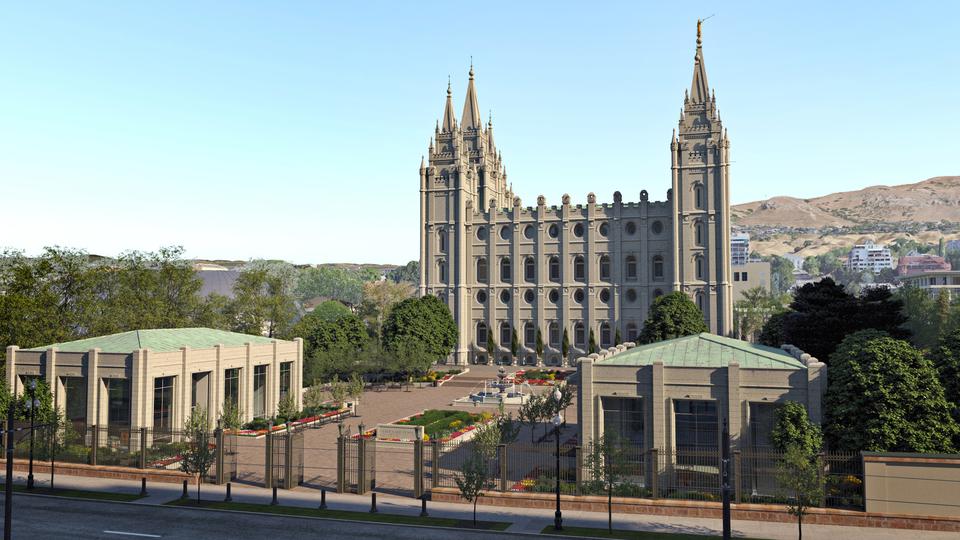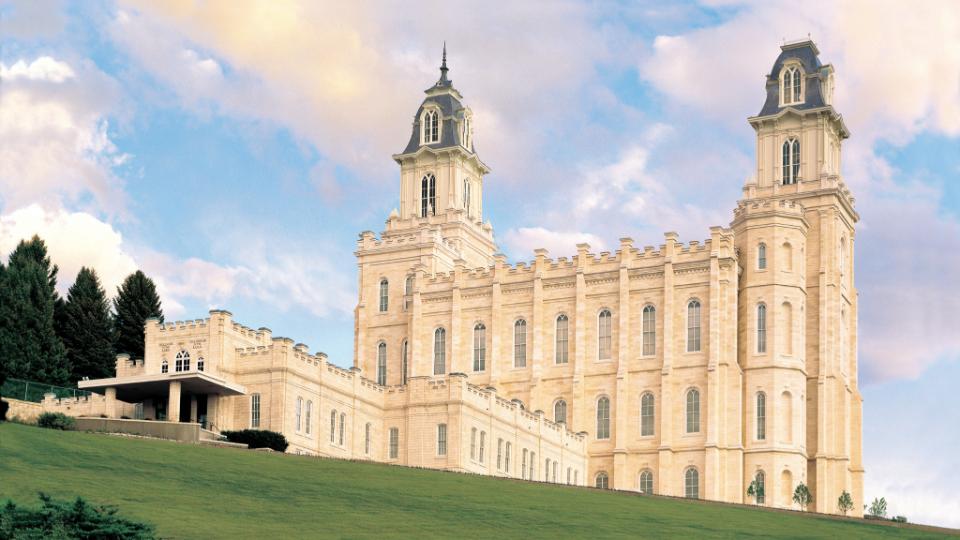This message was first published on March 12, 2021 and updated on March 24, 2021.
A message from the First Presidency:
Update on the Salt Lake Temple Renovation
From the time our pioneer forebears arrived in the Salt Lake Valley, the vision for, construction of, and worship in the Salt Lake Temple have held a special place in the minds and hearts of Church members. This sacred building is a symbol of our love for the Savior Jesus Christ. It is now being renovated and upgraded so that it may continue to fill that role for many, many years.

Salt-Lake-Temple-Renovation-
Rendering of the Salt Lake Temple’s south side2019 by Intellectual Reserve, Inc. All rights reserved.As this project has progressed, we have felt the Lord’s hand guiding us in modifying several aspects of the renovation. The Salt Lake Temple is at the heart of Church headquarters. As the Prophet Isaiah foretold, many will come to this house of the Lord from all nations (see Isaiah 2:2–3). Many changes are being made to ensure a familiar, uplifting experience for members who attend that temple. In addition to the seismic protection, which is the principal reason for the temple renovation, many other improvements and changes to the temple and its surroundings are being made.
- Two more instruction rooms, additional sealing ordinance rooms, and a second baptistry are being added to allow for greater capacity and more temple ordinances.
- Previously, the member experience in this temple included a progressive room-to-room presentation by live actors. When the temple reopens, this will transition to single-room presentations by film, available in more than 80 languages (previously presented only in English). This decision will also make it possible to hold more sessions each day. And finally, we hope it will help more members feel confident to serve as ordinance workers without the requirement for lengthy memorization.
- The area that previously housed the temple cafeteria will now accommodate additional temple facilities to support the increased capacity of the temple. There will not be a cafeteria included when the temple reopens.
- salt-lake-baptistry-new.jpg
- salt-lake-Endowment-room.jpg
- salt-lake-veil-Room.jpg
- salt-lake-Celestial-Room.jpg
- salt-lake-sealing-room.jpg
| Temple Square is always beautiful in the springtime. Gardeners work to prepare the ground for General Conference. © 2012 Intellectual Reserve, Inc. All rights reserved. | 1 / 2 |
As we make these significant changes for the future, many historic elements are being impacted. For example, the addition of new instruction rooms, a new method of presentation, seismic strengthening, and changes to meet accessibility requirements meant that the murals in the temple would need to be moved and/or repainted. It was impossible to know whether the murals could be preserved during such a move. They were originally painted directly on lath and plaster walls, which had been repaired and repainted many times because of water damage and other deterioration. Further, the change to a film presentation meant that the rooms would be reconfigured. For all these reasons, the murals were carefully photographed and documented before removal, and some of the original portions are being preserved in the Church’s archives. Many other historic features of the building have also been photographed, documented, replicated and in some cases, architecturally salvaged.
We look forward to the day when the renovation is complete and we can welcome friends from around the world to tour the temple prior to its dedication, and then for members to once again worship in this beautiful house of the Lord.
Manti Temple Announcement

manti-temple-2021.png
The Manti Utah TempleAs announced in April of 2019, the Manti Temple is also scheduled to be renovated and renewed as part of our effort to preserve and extend the life of our pioneer-era temples.
Beginning later this year, the Manti Temple will begin a multi-year renovation that will include mechanical updates and other changes to prepare the temple to serve for generations.
Similar to the changes in the Salt Lake Temple, the progressive room-to-room presentation by live actors will transition to single-room presentations by film. The murals will also be photographed, documented, and removed. Some elements of the temple’s structure will be updated to accommodate these changes and improve accessibility for patrons. The historic staircases in the Manti Temple (and Salt Lake Temple) are being preserved during the renovations.
The artwork in the Manti Temple includes murals painted by Minerva Teichert, which are valued not only for their beauty, but also as a treasured remembrance of the faith, talent and dedication of the artist.
The Teichert murals in the Manti Temple were originally painted on canvas, which was adhered to the plaster walls. The Church’s intent is to separate the canvas or portions of the canvas from the plaster and preserve the murals for future restoration and display in a public setting. We are seeking the advice of international experts in the field of art preservation during this process.
Conclusion
With each of these temples, there is a desire to ensure that the learning and experience are similar for all who come to the temple from anywhere in the world. The same ordinances, covenants and authority are available in every temple, and will now be presented in the same way, and now in more than 80 languages.
The historic pioneer-era temples have been a blessing to the Latter-day Saints for more than 140 years, and we know that with the updates and renovations now announced or underway they will continue to serve their sacred purpose for generations to come.
Q&A about the Salt Lake Temple Renovation
Why will the temple no longer offer a live presentation endowment?
This decision allows for greater capacity and more temple ordinances, making it possible to hold more sessions each day. With this change, the temple will be able to offer endowment sessions in multiple languages, allowing those who speak a language other than English to have a more meaningful, uplifting, and sacred temple experience. Finally, this adjustment will help more members feel confident to serve as ordinance workers without the requirement for lengthy memorization.
How will this impact the number of sessions each day compared to prior to the renovation?
Prior to the temple’s closure, sessions took place each hour. With five instruction rooms operating after the temple is re-opened, this will provide the capacity to offer sessions approximately every 20–30 minutes, allowing members more flexibility in attending the temple.
How many instruction rooms and sealing rooms will there be, and what will be their capacity?
After the renovation is completed, the temple will have a total of five instruction rooms, each with a capacity for 150 people. There will be 23 sealing rooms (up from 13) with varying capacities of up to 75 people, making it possible to perform more marriages and better accommodate wedding guests.
Where will the baptistries be located?
Both baptistries will be located in the lower level of the new temple annex, north of the historic temple. The current location of the baptistry will make way for the two new instruction rooms.
Where will the instruction rooms be located?
Four instructions rooms will be located on the first floor of the temple, and the fifth will be on the second floor.
What will be in the temple annex north of the temple?
The new temple annex will house the support facilities needed for a greater capacity temple including a bigger chapel, larger marriage waiting area, two new baptistries, and additional dressing rooms.
How much time will this add to the project?
More information about a completion date will be provided as the project progresses.
How much will this increase overall capacity for the temple?
We anticipate the temple will be able to accommodate more than double the usual number of patrons.
Do these changes impact the renderings previously released to the public?
Some of the renderings we have previously released have been adjusted based on these new plans. The new renderings are included in this release.
Will General Authorities still have their meeting space in the temple with these new designs?
Yes.
Does this impact other elements of the project, including the seismic upgrade?
The seismic upgrade, which is the principal purpose of the renovation, is proceeding as previously planned.
Why couldn’t the murals be preserved?
As the First Presidency said in their statement: “The addition of new instruction rooms, a new method of presentation, seismic strengthening, and changes to meet accessibility requirements meant that the murals in the temple would need to be moved and/or repainted. It was impossible to know whether the murals could be preserved during such a move. They were originally painted directly on lath and plaster walls, which had been repaired and repainted many times because of water damage and other deterioration. Further, the change to a film presentation meant that the rooms would be reconfigured. For all these reasons, the murals were carefully photographed and documented before removal, and some of the original portions are being preserved in the Church’s archives.”